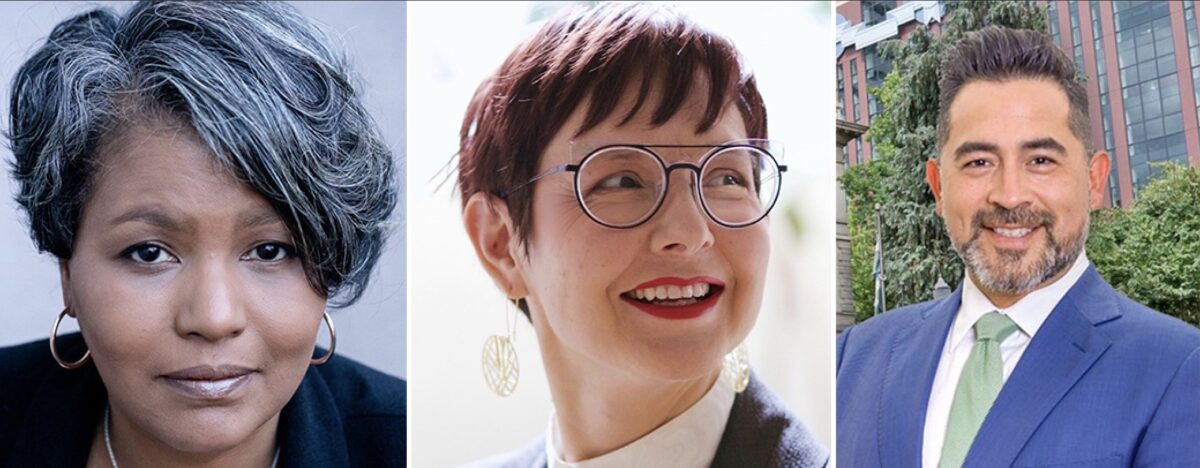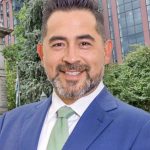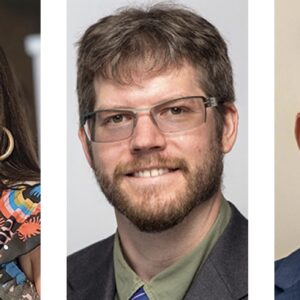
(Photos supplied by campaigns)
Welcome to our final round of responses from Portland City Council candidates.
Today we’ll hear from three people who want to be your next mayor: Teressa Raiford, Sarah Iannarone, and Ozzie Gonzalez.
Don’t miss our posts on council position 1 (Candace Avalos, Carmen Rubio, and Tim DuBois), position 2 (Tera Hurst, Julia DeGraw, Sam Chase), and position 4 (Mingus Mapps, Chloe Eudaly, Seth Woolley, Keith Wilson, Sam Adams).
BikePortland asked mayoral candidates the same six questions via email. Below are their responses (with some editing for brevity and clarity):
What is your relationship to cycling?
I grew up biking in Portland. I don’t as an adult and most of the time walking is how I get around. As a teenager I chipped most of my teeth riding bikes, we would be chased and harassed by drivers and sidewalks weren’t in good enough shape to make it safer. I believe we need to have a safer transit system in our vision for Portland that includes mobile accessibility all Portlanders.
As a young girl in a small factory town, I hopped on a bike to freedom and never stopped riding. I rode in my leisure time. I rode for transportation in cities like Charleston, S.C. and New Orleans, where that wasn’t really done. I’ve raised my family on a bike, built community on a bike, and now I’m running for office on a bike.
Cycling has empowered me and been a consistent source of joy.
But we know that freedom of mobility and access to opportunity afforded by the bicycle has not accrued to everyone in our city or society equitably. Where one technology provides opportunity to some, it can become a barrier for others. The perils of “biking while Black” have been clearly documented. For low-income people or apartment dwellers, access to a reliable bicycle with safe parking and adequate maintenance can be a challenge. For people living with disabilities, the autonomy and independence of cycling is sometimes structurally and culturally out of reach.
To steal the tagline from one of Portland’s cherished institutions, the Community Cycling Center, I remain convinced that the bicycle can be a great vehicle for change, but only if we as Portlanders are willing to tackle the inequalities that undergird our whole society. Regardless of the outcome this election cycle, I will continue to fight so any Portlander who desires it has access to safe cycling and the opportunity and happiness it affords.
I find cycling a liberating and relaxing activity and I do it with joy. It is a health inducing mode of transportation and an environmentally preferred mode of travel to every kind of motorized travel available on the market today. I cycle around downtown for daily activities on a regular basis and consider it one of the many modes of travel I employ for daily activities. It is one of my favorite ways to get around and is hands down the best way to move throughout Portland. I cycle frequently in the fair-weather months and walk or ride the bus more in the wetter months. It is quite normal for me to bike, walk, and ride a bus over the course of a day. Multi-modal is how I move.
Advertisement
Have you ever ridden a bike on high-traffic, high-speed arterial street? What was it like?
Teressa Raiford
“As a teenager we would be chased and harassed by drivers and sidewalks weren’t in good enough shape to make it safer.”
— Teressa Raiford
I have not, but my daughter rides a bicycle and as someone who has never learned to drive it has been her main source of transportation for several years while she’s lived in major cities like Denver and Austin. We need to improve access to create more efficient and safe travel.
Sarah Iannarone
I resided at SE 148th & Powell Blvd in 2017-18 and now live near Foster Road, so what transportation agencies define as “arterials,” or “collectors,” I consider my neighborhood streets where I catch the bus, go to the store, walk my dog, or meet up with friends.
So, yes, I end up biking on “high-traffic, high-speed arterial streets” all the damn time whether I feel like it or not and unless it’s the middle of the night or the middle of a pandemic, it’s harrowing. But frankly, these streets are terrible for all Portlanders, not just cyclists. In 2019, we had 51 traffic deaths on Portland streets. When you look at a map of our high crash corridors and intersections, most deaths — regardless of transportation mode — are happening on these streets.
“On my watch, ending the bloodshed in our streets will be a council-wide and citywide priority.”
— Sarah IannaroneI’m not going to sugarcoat this: the level of traffic violence on our streets is simply unacceptable and as mayor I will not remain silent on this issue nor relegate it to the realm of transportation. On my watch, ending the bloodshed in our streets will be a council-wide and citywide priority. I plan to tackle the hypocrisy implicit in the gap between our Vision Zero rhetoric and investments as a priority of my administration. We will tackle this problem from the perspective of our city’s most vulnerable, meaning pedestrians, people using high crash corridors and intersections, areas where there are high populations of youth and elders (parks, school, community centers, care facilities, etc), and in geographies identified as high-risk in PBOT’s equity matrix. (This and other proposals for eliminating traffic fatalities are included in my “Rethinking Public Safety” policy at www.sarah2020.com/publicsafety.)
Ozzie Gonzalez
“On two occasions I collided with automobiles while bicycling and was even knocked unconscious by an automobile who hit me on the street.”
— Ozzie Gonzalez
Yes, I have. I used to commute by bicycle to work every day along Route 66 into downtown Los Angeles. They were the most adventurous 6 miles of my life and I had to live that adventure every day. The corridor was high volume traffic, wide lanes, and had no bike lanes. I had to stay on high alert constantly and had more than one accident over the course of those five years to drive home the importance of environmental awareness. I was constantly faced with dangerous and potentially dangerous situations. On two occasions, I collided with automobiles while bicycling and was even knocked unconscious by an automobile who hit me on the street. I had one bicycle ruined during a collision and have counted my blessings many times when arriving home safely after a day’s commute.
I know how much design matters in this situation and as someone who is frequently traveling across multiple modes of transportation in Portland, I can attest to the challenges cyclists have on Portland streets. I understand the value of clearly designed, well-organized throughways. For this reason, Portland’s bike-friendly infrastructure and conscientious multi-modal design was a major factor in attracting me to raise my family and build my career in Portland.
Bicycling to work in Portland is at its lowest point in 12 years. What do you think is causing that and what are two things we can do to increase bicycling in Portland?
Teressa Raiford
As someone who has asthma I can guess that a lot of people moving here were not aware of the air quality. That has a lot to do with being able to ride. The air quality and lack of investment in roads, sidewalks and signage, lighting etc make transportation by bike a high risk. The number of people being killed in traffic related incidents proves this is because of a lack of investment and engagement with vulnerable communities that ride.
Sarah Iannarone
That Portland has held relatively steady on mode split even as our population and number of commuters has ballooned should not be dismissed; however, in the middle of a climate crisis and traffic violence epidemic, just keeping up is actually falling behind. Now, as we face the COVID-19 recovery in the midst of a global recession if not depression, and in which we’re predicting (at least in the short term) plummeting transit ridership, we are going to need to act with urgency, creativity, and efficiency to transform our transportation system for human health, climate action, and economic development.
How can we blame people priced out of the urban core to the edge of the city (and region) where transit service is spotty or non-existent for not abandoning the personal autos on which they depend? We need to look beyond transportation to the citywide creation of compact, socioeconomically diverse neighborhoods connected by active transportation and transit infrastructure as the primary focus of our urban development work the next decade. That’s why I’ve been so supportive of housing initiatives and land-use policies to end racist, exclusionary zoning and increase the supply of affordable housing in Portland including the Residential Infill Project, Better Housing By Design, and the city’s Residential Bike Parking code update. We have to make it easier for Portlanders to live in dense neighborhoods by building more housing in these areas (and challenging outdated automobile parking policy is certainly part of the work to get us there).
I will also give a shoutout to my beloved e-bike as an economic and workforce development tool. As someone who lives in a neighborhood where 82nd Avenue crosses Foster Road, it’s been absolutely transformative for me. In fact, prior to COVID-19, it enabled me to cycle to nearly every campaign event of a grueling citywide race. We need to be aggressively subsidizing access to e-bicycles for Portlanders, particularly for low-income families and East Portland residents. This could be a boon to small businesses, delivery services, and even companies doing repair and manufacturing. The improvements to air quality alone would justify the costs of any public investments to make it easier for package delivery drivers to use cargo bikes instead of big trucks. My Green New Deal policy, released the week of the youth climate strike back in September, includes specific shoutouts to “launch e-bike ownership incentive programs for low-income and households of Color; intensify investments in transit-only lanes (bus and rail), bicycle and LIT lanes, and low-income LIT subsidies (e-scooter, e-bike, cargobike and bikeshare programs) across the city.”
Ozzie Gonzalez
“Bring jobs closer to housing and bring more bike friendly amenities into the city.”
— Ozzie Gonzalez
The biggest factor influencing bicycle commuting rates and our transportation footprint Is the growing distance between housing and employment centers for Portlanders. The increased cost of housing in the urban core has pushed people farther out into the edges. Meanwhile, the number of jobs available in the edges of the city has not increased. This means people are having to travel farther to get to work and depending on other means of transport for more of their daily needs. This reduces the likelihood that people will choose to bike to work and significantly reduces the amount of activities they will be able to accomplish in a day by bicycle.
The good news is that all of this is fixable. Two things we can do about this are bring jobs closer to housing and bring more bike friendly amenities into the city. I see many opportunities to include bike centric amenities into multi-family housing building codes as well as to incentivize more bike amenities such as valet parking and service centers as well as safer storage options. My transit- oriented development policy initiative addresses both of these things.
Why is it so important for cycling to remain a high priority issue in City Hall?
Teressa Raiford
“Covid-19 shows the inequities of environmental devastation caused by motor pollution.”
— Teressa Raiford
Bicycling is the future of Portland. I grew up and witnessed the changes in Portland when TriMet came on the scene and even more changes as we moved to the light rail.
I am also experiencing the reality being shown to us due to the current Covid-19 health crisis. It shows the inequities of environmental devastation caused by motor pollution and other variables. We have definitive science to match what systematically injured communities have suffered for decades. It’s time to approach public health as a crisis and need for reconstruction in how cities provide services to people. The lack of cars on the highway has not reduced the ability for Portland city government to run. We should use our current examples of industry and mobility online to build a vision that helps us continue the decline while also adapting strategies that include more accessiblity for riders and Portlanders with the need for safe and healthy mobility on bikes.
Advertisement
Sarah Iannarone
Listen– we are facing some really challenging times ahead and we need to stop siloing our priorities across transportation mode or interest group. Instead, we need to do everything in our power to 1) act with urgency on climate change, 2) increase the supply of affordable housing/prevent displacement and 3) address the staggering inequality that’s undermining our city’s resiliency and prosperity. The bicycle is going to be an important tool in our kit, but for practical purposes not ideological ones. In my administration, we’re going to allow communities to lead on community planning and implementation and we will select projects and assess progress through application of objective criteria in these three areas.
Dense, walkable neighborhoods that have an abundance of housing types and are connected by safe, convenient bicycle access solves so many of our pressing urban problems at once. It’s good for our climate goals. It’s good for our air quality goals. It’s good for encouraging physical activity. It’s good for affordability. And a vibrant, creative bicycling culture is good for communities and businesses.
But none of this works if access to safe, low carbon mobility is not equitable, so in my administration we will be empowering and fully resourcing a diversity of partners across this city to lead in this work: our communities are going to lead with our city agencies providing the necessary technical support.
My commitment to climate action and, by extension, active transportation, has been a defining characteristic of my life, not just a campaign slogan. I believe that I received the endorsement of the Street Trust Action Fund because they expect nothing less than continued passion and advocacy from me on this front.
Ozzie Gonzalez
It is very important that cycling remain a priority issue in city hall because it is the healthiest, most environmentally friendly way to move through the city. Most importantly, bike culture is part of our identity as a city and we must celebrate that through our design and policymaking.
Do you think PBOT should respond to how the pandemic has impacted streets and how we use them? If not, why not? If so, what do you think they should do?
Teressa Raiford
Please refer to my prior answer. I believe we should use our innovation and information to build standards that will direct change.
Sarah Iannarone
It’s cliche to suggest that “this coronavirus outbreak changes everything,” but it’s undeniably true that financial hardships coming our way in the months and years ahead is going to change “business as usual,” creating substantial budgetary hurdles for us to fully implement the Rose Lane Project, build out our neighborhood “In Motion” plans, or raise revenue for the Fixing Our Streets program. (Please vote yes on Measure 26-209!) Andrew Theen at the Oregonian reported this that the Highway Trust Fund is on schedule to go bankrupt in the next couple years.
A bikeable, walkable, transit-prioritized Portland is not just better for our lungs, our climate, our equity goals, and quality of life: it’s cheaper and creates green jobs.
As the mayor of Portland through our mid- and long-term recovery, I will press for strategic investments in the low-carbon, healthy, equitable neighborhoods that we’ve come close to achieving in some parts of town but seriously fallen short of in others. Having a mayor who understands this city intimately at the street-level is going to be key. I believe that when we harness our resources and empower our people, the City of Portland is going to be a formidable force for transformative change: by returning to our roots as a city driven by innovation and grassroots community, we will be able to accomplish more with less and regain our position as a global, green city leader.
Ozzie Gonzalez
I believe PBOT and every Bureau in the city of Portland need to look at how the pandemic effects the way they serve the public and how the public interacts with their departments. The best thing PBOT can do in the wake of this pandemic is to learn from the experience and explore how they will ensure public health and safety protocols are established and implemented. PBOT should also adjust how critical access corridors are protected for emergency functions.
Advertisement
If you were in charge of PBOT, what would you do to make cycling more attractive and safe east of 82nd?
Teressa Raiford
I would go and spend time listening and engaging with the cycling community. They have the most immediate ideas and information because they are often called upon to volunteer and to voice opinions, ideas and concerns. I believe Portlanders really do understand and want a voice when it comes to the need for biking accessibility in all of our neighborhoods. I believe we have to direct leaders and make demands that ensure a strategy and platform for attractive and safe riding is created because of informed engagement, an impactful government that seeks to make decisions with us, not for us.
Sarah Iannarone
In the years I lived in East Portland without owning a car, I spent hours on TriMet stuck in traffic or stranded and calling a Lyft because there were no bikesharing or carsharing options. I’ve waded through puddles and potholes to get to the supermarket, and walked miles to find the nearest coffee shop or library. And yes, I’ve absolutely biked on those dangerous arterials in East Portland. I’ve also experienced the fabulous diversity of East Portland– the people, cultures, and cuisines as well as the biodiversity and natural areas.
The epidemic of traffic violence in our community continues to worsen, despite a decade of growing advocacy from community groups demanding the investments in infrastructure and changes in policy to make the simple act of walking to a bus stop or biking to a middle school safe for all Portlanders. I will lead the charge on pushing ODOT to expedite the transferring of the “orphan highways” like 82nd Avenue, implementing community-led development policy to prevent displacement and promote environmental justice in high-risk communities in these corridors.
East Portland (and the crescent of disinvestment that stretches from Columbia/Lombard to Brentwood-Darlington/Clackamas County) has never had a mayor who used her own personal, lived experience of this area to inform policy and investment priorities. I see thriving, intergenerational communities prospering in East Portland with the appropriate reinvestment coupled with meaningful anti-displacement and community empowerment initiatives. I’m deeply grateful for organizations including Unite Oregon, Rosewood Initiative and the East Portland Action Plan who are building political power to realize their vision, and the extent to which these and other East Portland organizations have increasingly become vocal leaders for transportation investments from municipal and regional leaders. As Mayor, I look forward to finding opportunities for collaboration and community engagement to achieve our shared goals.
Ozzie Gonzalez
One of my top policy priorities is a “Safe Streets Initiative” that will work with neighborhoods for the expressed purpose of making streets more attractive and safer for pedestrians and cyclists. I have already identified the neighborhoods east of 82nd as the place to start that process.
By prioritizing the areas with the highest safety risks and correcting those areas first, my “Safe Street Initiative aims to reduce the fatality rate for cyclists and pedestrians significantly in its first year. The second step in my plan is to introduce bicycle parking, charging stations, and bike rentals in more places so that people have options available to them throughout East Portland.
With every one of the projects under this initiative, the priorities and objectives of the projects will be established with the full participation of the local neighborhoods in which the projects will exist. I am committed to personally working with neighborhoods east of 82nd to identify safety hazards and explore their possible solutions. As mayor, I am committed to seeing those projects through by supporting the funding and permitting process as a partner and by incentivizing private investments in the neighborhood through my transit-oriented development policy initiative.
Browse all our Election 2020 coverage here.
— Jonathan Maus: (503) 706-8804, @jonathan_maus on Twitter and jonathan@bikeportland.org
— Get our headlines delivered to your inbox.
— Support this independent community media outlet with a one-time contribution or monthly subscription.










Thanks for reading.
BikePortland has served this community with independent community journalism since 2005. We rely on subscriptions from readers like you to survive. Your financial support is vital in keeping this valuable resource alive and well.
Please subscribe today to strengthen and expand our work.
So if Iannarone is elected, nothing can be done about Cycling until we address all the inequity and race problems and most everything else.
This will be her go-to for why nothing can ever be changed or accomplished.
Please vote for someone else.
Any suggestions? I mean, to me she sounds more focused and fired up about active transportation than anyone else in the race.
That’s DR. IANNARONE, thank you very much.
Did she complete a dissertation? Her own bio says she didn’t.
Her blatant misrepresentation of her degree in her candidate statement is yet another of the myriad of reasons she is terribly unfit for office.
I don’t see it like that at all dwk.
What I do see is that we still have a lot of work to do on racial and other types of equity/justice issues. We need leaders who are committed to working on these things in tandem with other issues. More importantly, we need leaders who have the ability, credibility, and integrity to lead on these issues. I don’t see Iannarone as a “nothing can change” candidate at all. If anything, she seems like the opposite. Leading through change is a hard thing and it requires people who understand what those changes mean to everyone.
I also don’t see “cycling” as a separate thing that lives in isolation from issues like racism and the ravages of our unequal systems. Mobility is directly connected to those issues and we can’t address one without impacting the others. We need people who understand these complexities and dynamics of how to do progressive transportation reform in a way that lifts up people in our system who need a hand and delivers the more traditional infrastructure-related results we (brown, white, black, poor, middle income, wealthy, and so on) need.
I’ve been around local politicians for almost a decade at this point, and we’ve genuinely *never* had a candidate (let alone a candidate for Mayor) who understands what bicycling, biking culture, and building livable streets means for Portland quite like Sarah. It’s *unprecedented* to have a candidate run for office who is car-free, let alone one who uses her e-bike to zoom all around town. Check out the depth of her responses, her grasp of the issues, and the extent to which she has been aligned on Vision Zero, freeway fightin’, and e-bikes long before she ran for mayor.
If you’re reading bikeportland and want to help Sarah get elected, her campaign is lookin’ for volunteers in the next week to help run some phonebanks and make sure we get all the ballots turned in. We’ll need every bit of help you can give:
https://sarah2020.com/en/vote
There is nothing in her bio that suggests she’d be an effective administrator.
She comes across as a lifelong grad student in a particular discipline who is sure that all of their good ideas on paper are applicable to successful implementation in the real world.
Those people have their role, but being Mayor of a large city is not one of them.
Sarah ran a restaurant for over a decade, and also built a new program from scratch at Portland State University, all as a working class mom in outer southeast Portland.
I feel like the administration role of the mayoral job is heavily understated. You’re essentially a manager of multiple city bureaus in a huge bureaucracy.
Additionally, you’re essentially just one vote on a city council. Being able to negotiate your vision will require compromises…if you can sell your vision to the other commissioners at all. And anything you pass (limited in scope to the city limits) will have to follow a narrow purview that will have to comply with state and federal laws, which oftentimes supercede any local regulation. A lot of issues require regional solutions…not easy to do considering huge portion of our region encompasses an entirely different state.
Ultimately, it’s important to have a strong, intentional vision that I feel is lacking in our current administration, but it’s often the policy wonks that work in the background, crafting carefully worded policy and fussing over the details that end up making the most meaningful changes.
This shouldn’t be construed as a plug for any candidate, but something to be cognizant of regardless of who you vote for.
Well stated. Thank you.
I ran for mayor without ever STARTING a dissertation.
Sounds like Ozzie is the bravest. A guy who can handle LA like that could do PDX some good!
I met him at a party a few months ago. He’s a nice guy – we got into a brief discussion about transit oriented design over a glass of wine. He struck me as fairly pragmatic, which is what I think a Mayor needs to be.
I’ve noticed he calls himself an architect regularly, and while he has a degree in it, he’s not registered in Oregon from what I saw. I don’t know if he’s registered anywhere else. Similarly to doctors, lawyers, etc. becoming an architect requires several years of internship plus passing a rigorous test. So if he’s done that in another state, great. If not, it’s a credibility issue.
There is an easy change right now to save this city that Wheeler or any of these people are not addressing or have no imagination.
Really take over the streets, let restaurants and retail stores set up on sidewalks and streets for the pandemic.
Simple real change that would help save Portlands restaurants and small business.
Break some rules and make some new ones.
No imagination from any of these people, just buzzwords and talking points.
It is a new world.
PLEASE get Wheeler out of office. Now.
I voted for Sarah Iannarone, and I believe that she would be the most effective mayor that we’ve ever had in my lifetime. I also am a big fan of Teressa Raiford.
Ozzie would be great too.
Two faced, white-supremacist-bag-over-head-in-fear, trust fund, never heard of Sunday Parkways even when he was elected, frat boy from the hills Ted Wheeler does not get 99% of Portlanders. Elect a real leader.
But, her emails?
Recent story of Bike Portland readers supporting Sarah Iannarone:
https://bikeportland.org/2020/02/26/portland-bike-shop-will-host-event-in-support-of-mayoral-candidate-sarah-iannarone-311506
OPB interview: https://www.opb.org/radio/programs/thinkoutloud/segment/gov-brown-biking-running-iannarone-interview/
Disclaimer: I have a Sarah for Mayor sign in front of my house. So do the other 3 houses on my block that all use bikes as primary mode of transport.
She ran a small cafe that is self-described as a “hole in the wall”and is now closed.
She built “First Stop Portland”, a “program” that set up tours for visiting businesspeople and planners on junkets.
And that is your list of qualifications for running a city with a $5.5 billion budget? That’s about as overstated as listing a PhD with (ABD) in parentheses.
Gotta love them Portland radicals. Frat boy! White supremacist! Doesn’t get 99% of Portlanders but I sure do!
It’s true. Unfortunately, they can’t all be so amazingly qualified as Wheeler, who dabbled in policy wonkness before assuming a sweet gig in their brother’s investment company with zero experience, then won a surprise local election before ruybbing enough elbows to get appointed to State Treasurer.
That resume is the domain of only privilieged white men. Crazy that some of these losers have to settle for being well-educated policy experts and running small businesses that don’t meet your exacting standards.
Reply fail. That was for timothy.
Still no questions about urban mountain biking… MTB rights are bike rights, to turn a phrase.
Cyclekrieg,
As I’ve said before. I needed to keep the questions the same for every candidate. They were all sent the same questions at the same time. I chose to not send a follow-up email with another questions. Please keep in mind these candidates are super busy and have tons of questions to respond to. I understand you care a lot about off-road cycling. So do I! (as you well know). I messed up by not including that question. Sorry for that. There will be more opportunities in the general and in future to address that issue.
Oh, I know, but squeaky wheel gets the grease… 🙂